Analyzing Ethical Responsibilities in Early Childhood Education
VerifiedAdded on 2023/05/28
|7
|1519
|96
Essay
AI Summary
This essay discusses the code of ethics for early childhood educators, emphasizing the importance of maintaining high ethical standards to support a nurturing environment for children. It highlights key principles such as promoting child well-being, using developmentally appropriate practices, demonstrating care, partnering with parents and colleagues, enhancing human dignity, pursuing ongoing professional development, and maintaining integrity in professional relationships. The essay underscores the need for educators to be aware of ethical responsibilities and capable of resolving dilemmas in accordance with the code of ethics, ultimately creating a supportive and enriching environment for the children.
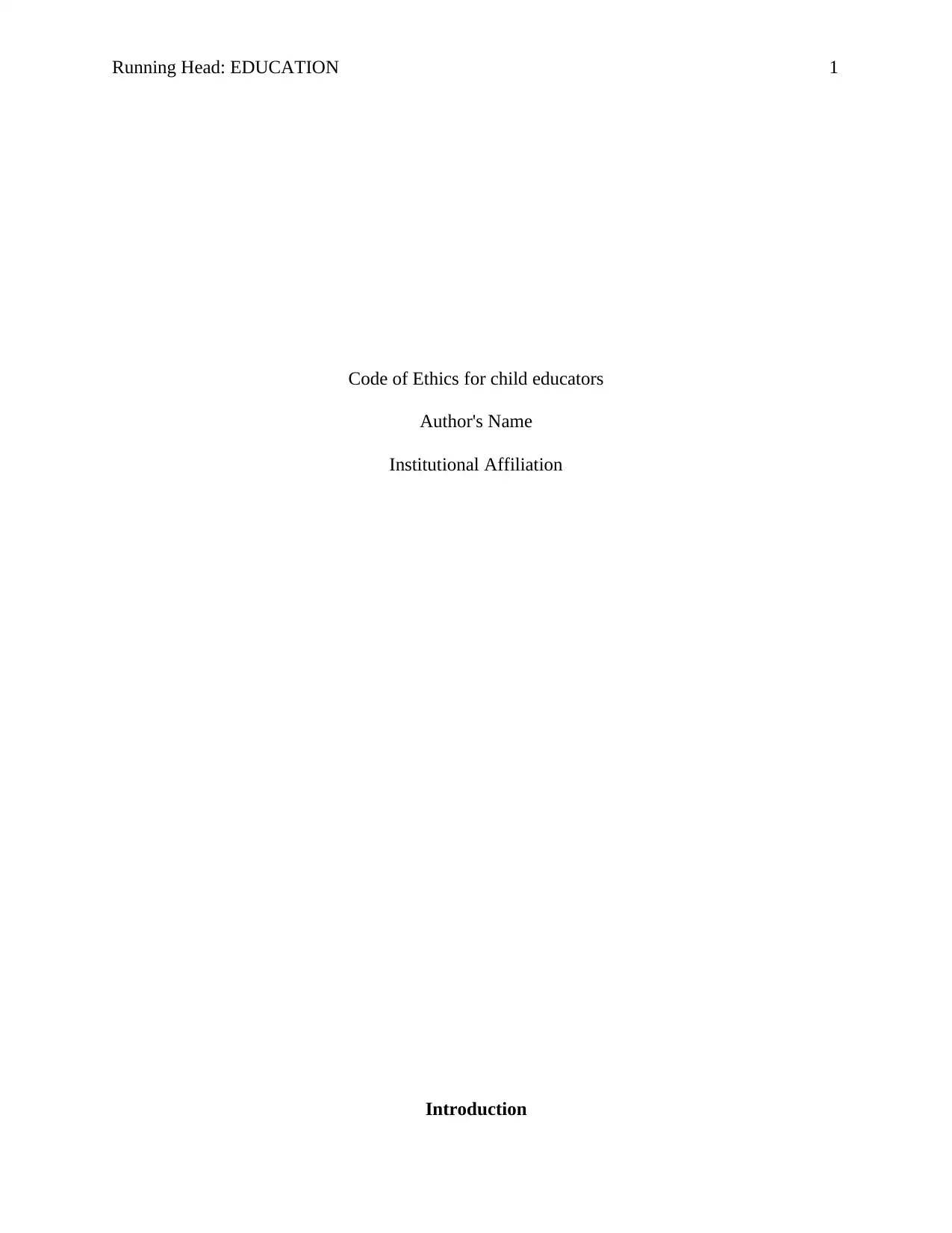
Running Head: EDUCATION 1
Code of Ethics for child educators
Author's Name
Institutional Affiliation
Introduction
Code of Ethics for child educators
Author's Name
Institutional Affiliation
Introduction
Paraphrase This Document
Need a fresh take? Get an instant paraphrase of this document with our AI Paraphraser
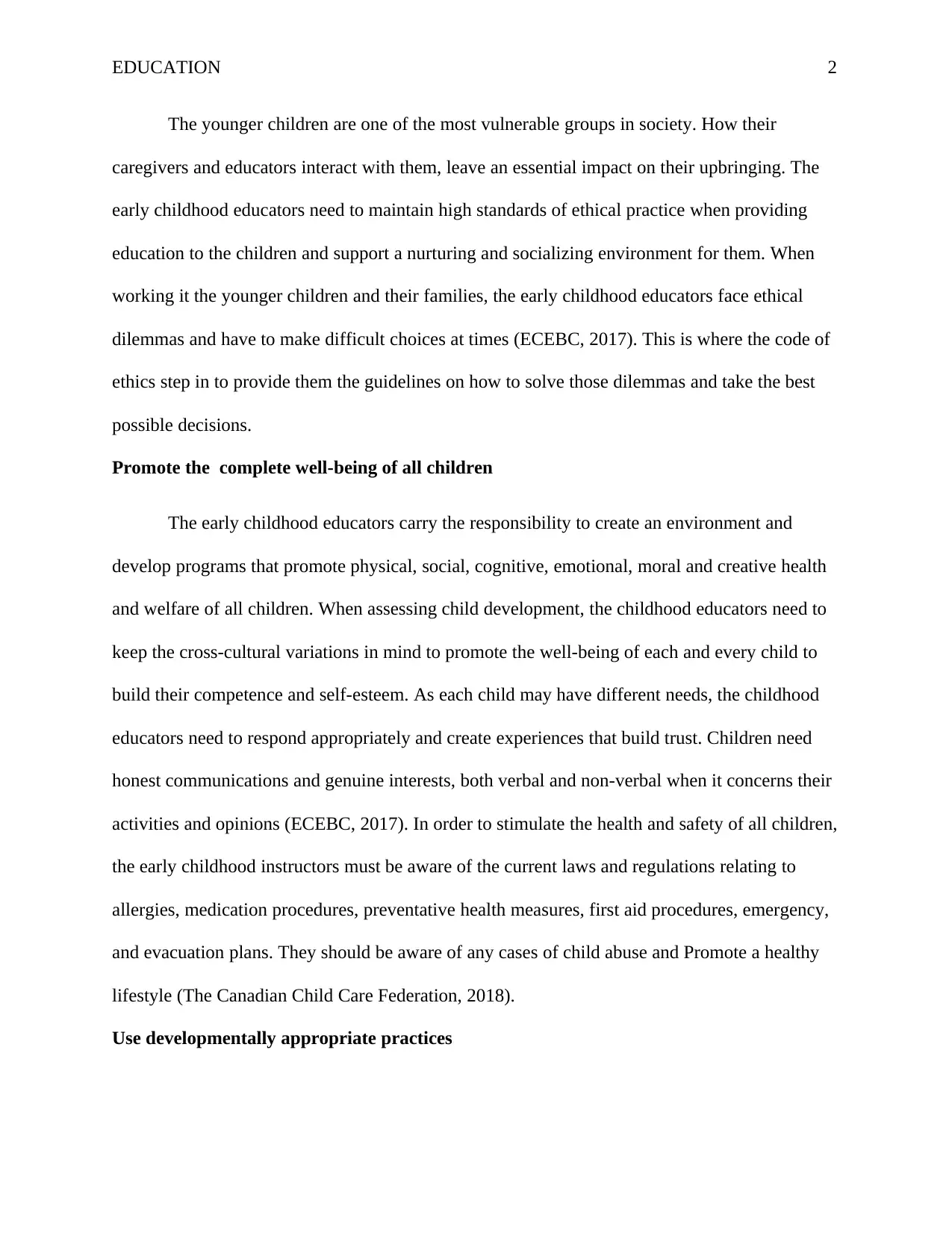
EDUCATION 2
The younger children are one of the most vulnerable groups in society. How their
caregivers and educators interact with them, leave an essential impact on their upbringing. The
early childhood educators need to maintain high standards of ethical practice when providing
education to the children and support a nurturing and socializing environment for them. When
working it the younger children and their families, the early childhood educators face ethical
dilemmas and have to make difficult choices at times (ECEBC, 2017). This is where the code of
ethics step in to provide them the guidelines on how to solve those dilemmas and take the best
possible decisions.
Promote the complete well-being of all children
The early childhood educators carry the responsibility to create an environment and
develop programs that promote physical, social, cognitive, emotional, moral and creative health
and welfare of all children. When assessing child development, the childhood educators need to
keep the cross-cultural variations in mind to promote the well-being of each and every child to
build their competence and self-esteem. As each child may have different needs, the childhood
educators need to respond appropriately and create experiences that build trust. Children need
honest communications and genuine interests, both verbal and non-verbal when it concerns their
activities and opinions (ECEBC, 2017). In order to stimulate the health and safety of all children,
the early childhood instructors must be aware of the current laws and regulations relating to
allergies, medication procedures, preventative health measures, first aid procedures, emergency,
and evacuation plans. They should be aware of any cases of child abuse and Promote a healthy
lifestyle (The Canadian Child Care Federation, 2018).
Use developmentally appropriate practices
The younger children are one of the most vulnerable groups in society. How their
caregivers and educators interact with them, leave an essential impact on their upbringing. The
early childhood educators need to maintain high standards of ethical practice when providing
education to the children and support a nurturing and socializing environment for them. When
working it the younger children and their families, the early childhood educators face ethical
dilemmas and have to make difficult choices at times (ECEBC, 2017). This is where the code of
ethics step in to provide them the guidelines on how to solve those dilemmas and take the best
possible decisions.
Promote the complete well-being of all children
The early childhood educators carry the responsibility to create an environment and
develop programs that promote physical, social, cognitive, emotional, moral and creative health
and welfare of all children. When assessing child development, the childhood educators need to
keep the cross-cultural variations in mind to promote the well-being of each and every child to
build their competence and self-esteem. As each child may have different needs, the childhood
educators need to respond appropriately and create experiences that build trust. Children need
honest communications and genuine interests, both verbal and non-verbal when it concerns their
activities and opinions (ECEBC, 2017). In order to stimulate the health and safety of all children,
the early childhood instructors must be aware of the current laws and regulations relating to
allergies, medication procedures, preventative health measures, first aid procedures, emergency,
and evacuation plans. They should be aware of any cases of child abuse and Promote a healthy
lifestyle (The Canadian Child Care Federation, 2018).
Use developmentally appropriate practices
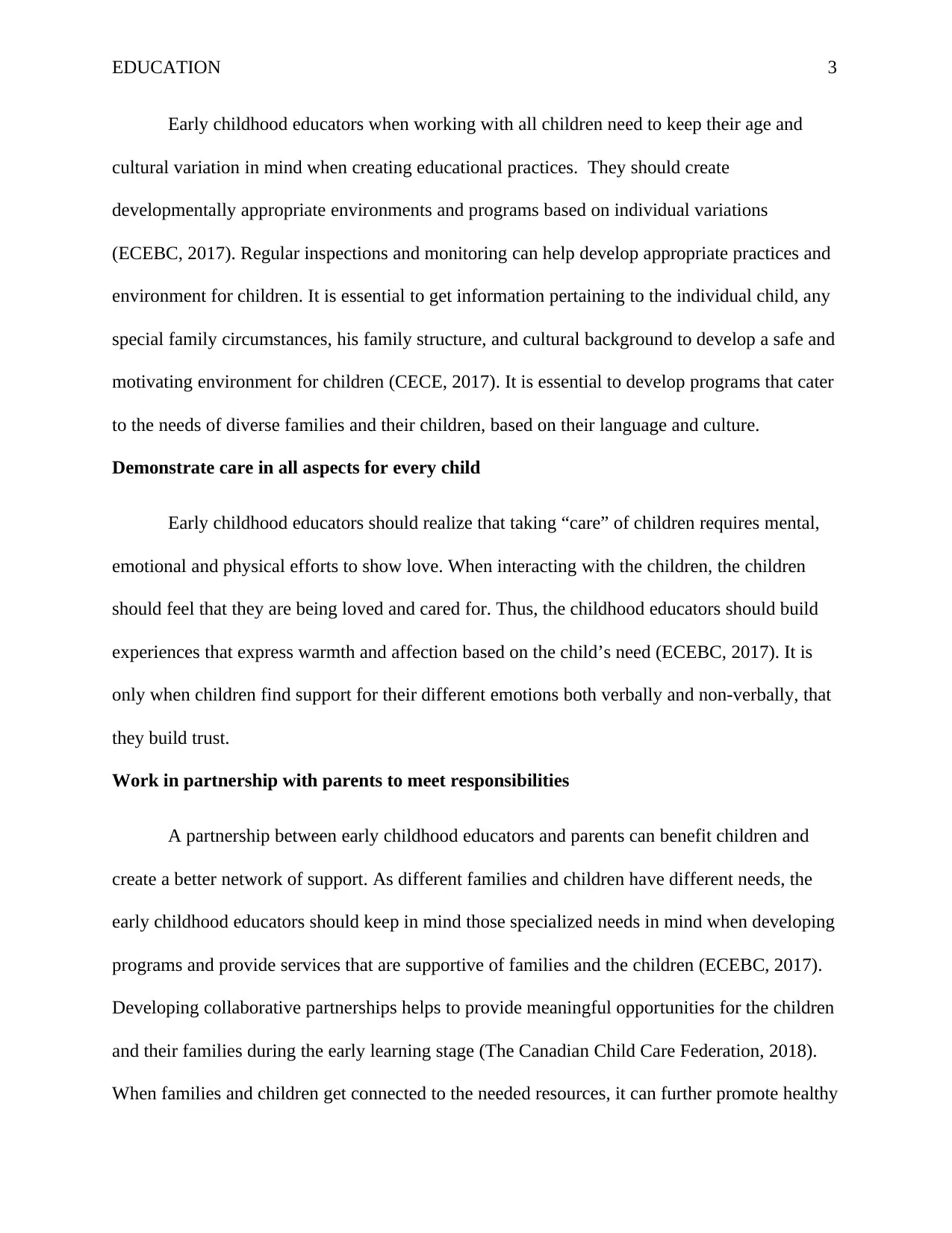
EDUCATION 3
Early childhood educators when working with all children need to keep their age and
cultural variation in mind when creating educational practices. They should create
developmentally appropriate environments and programs based on individual variations
(ECEBC, 2017). Regular inspections and monitoring can help develop appropriate practices and
environment for children. It is essential to get information pertaining to the individual child, any
special family circumstances, his family structure, and cultural background to develop a safe and
motivating environment for children (CECE, 2017). It is essential to develop programs that cater
to the needs of diverse families and their children, based on their language and culture.
Demonstrate care in all aspects for every child
Early childhood educators should realize that taking “care” of children requires mental,
emotional and physical efforts to show love. When interacting with the children, the children
should feel that they are being loved and cared for. Thus, the childhood educators should build
experiences that express warmth and affection based on the child’s need (ECEBC, 2017). It is
only when children find support for their different emotions both verbally and non-verbally, that
they build trust.
Work in partnership with parents to meet responsibilities
A partnership between early childhood educators and parents can benefit children and
create a better network of support. As different families and children have different needs, the
early childhood educators should keep in mind those specialized needs in mind when developing
programs and provide services that are supportive of families and the children (ECEBC, 2017).
Developing collaborative partnerships helps to provide meaningful opportunities for the children
and their families during the early learning stage (The Canadian Child Care Federation, 2018).
When families and children get connected to the needed resources, it can further promote healthy
Early childhood educators when working with all children need to keep their age and
cultural variation in mind when creating educational practices. They should create
developmentally appropriate environments and programs based on individual variations
(ECEBC, 2017). Regular inspections and monitoring can help develop appropriate practices and
environment for children. It is essential to get information pertaining to the individual child, any
special family circumstances, his family structure, and cultural background to develop a safe and
motivating environment for children (CECE, 2017). It is essential to develop programs that cater
to the needs of diverse families and their children, based on their language and culture.
Demonstrate care in all aspects for every child
Early childhood educators should realize that taking “care” of children requires mental,
emotional and physical efforts to show love. When interacting with the children, the children
should feel that they are being loved and cared for. Thus, the childhood educators should build
experiences that express warmth and affection based on the child’s need (ECEBC, 2017). It is
only when children find support for their different emotions both verbally and non-verbally, that
they build trust.
Work in partnership with parents to meet responsibilities
A partnership between early childhood educators and parents can benefit children and
create a better network of support. As different families and children have different needs, the
early childhood educators should keep in mind those specialized needs in mind when developing
programs and provide services that are supportive of families and the children (ECEBC, 2017).
Developing collaborative partnerships helps to provide meaningful opportunities for the children
and their families during the early learning stage (The Canadian Child Care Federation, 2018).
When families and children get connected to the needed resources, it can further promote healthy
⊘ This is a preview!⊘
Do you want full access?
Subscribe today to unlock all pages.

Trusted by 1+ million students worldwide
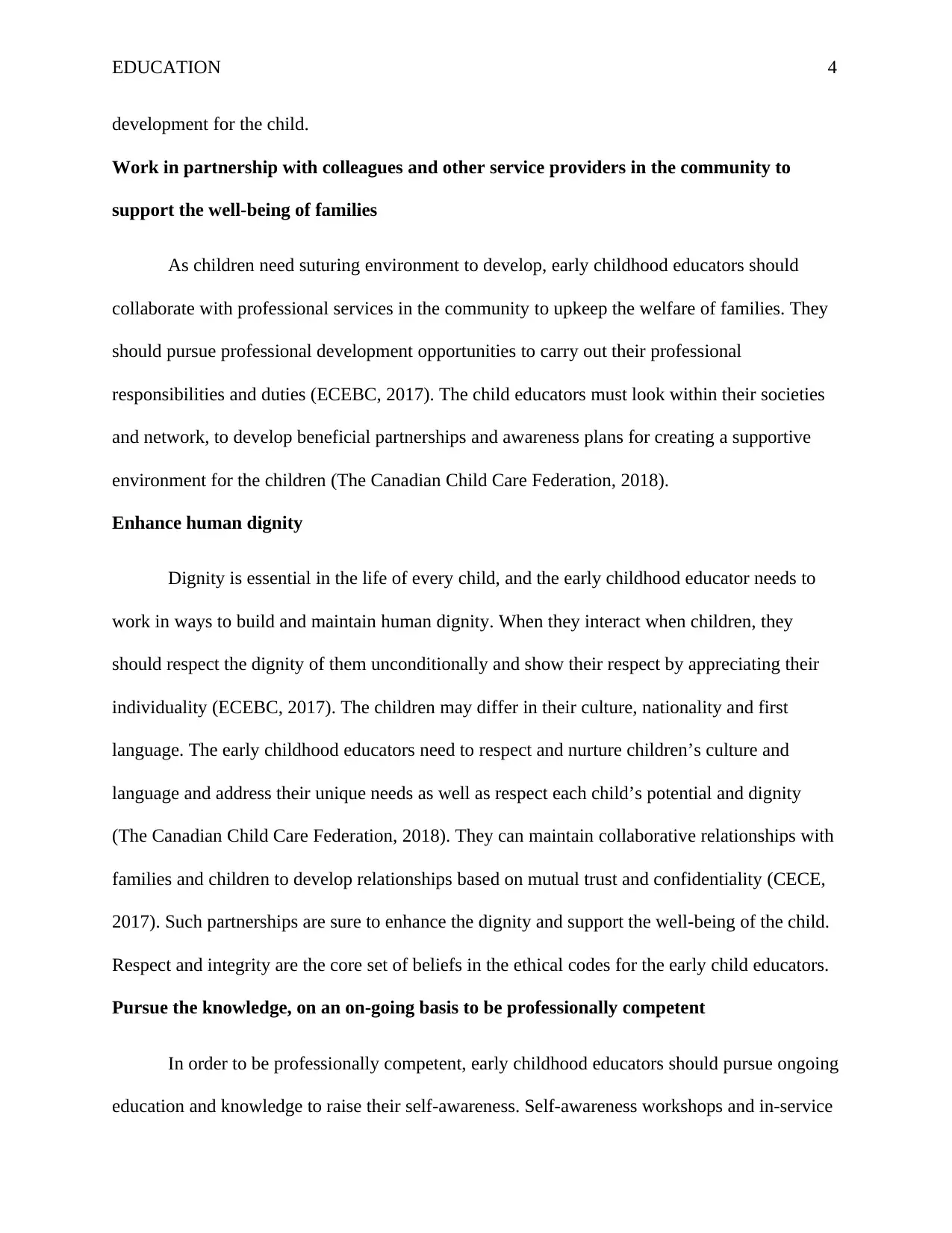
EDUCATION 4
development for the child.
Work in partnership with colleagues and other service providers in the community to
support the well-being of families
As children need suturing environment to develop, early childhood educators should
collaborate with professional services in the community to upkeep the welfare of families. They
should pursue professional development opportunities to carry out their professional
responsibilities and duties (ECEBC, 2017). The child educators must look within their societies
and network, to develop beneficial partnerships and awareness plans for creating a supportive
environment for the children (The Canadian Child Care Federation, 2018).
Enhance human dignity
Dignity is essential in the life of every child, and the early childhood educator needs to
work in ways to build and maintain human dignity. When they interact when children, they
should respect the dignity of them unconditionally and show their respect by appreciating their
individuality (ECEBC, 2017). The children may differ in their culture, nationality and first
language. The early childhood educators need to respect and nurture children’s culture and
language and address their unique needs as well as respect each child’s potential and dignity
(The Canadian Child Care Federation, 2018). They can maintain collaborative relationships with
families and children to develop relationships based on mutual trust and confidentiality (CECE,
2017). Such partnerships are sure to enhance the dignity and support the well-being of the child.
Respect and integrity are the core set of beliefs in the ethical codes for the early child educators.
Pursue the knowledge, on an on-going basis to be professionally competent
In order to be professionally competent, early childhood educators should pursue ongoing
education and knowledge to raise their self-awareness. Self-awareness workshops and in-service
development for the child.
Work in partnership with colleagues and other service providers in the community to
support the well-being of families
As children need suturing environment to develop, early childhood educators should
collaborate with professional services in the community to upkeep the welfare of families. They
should pursue professional development opportunities to carry out their professional
responsibilities and duties (ECEBC, 2017). The child educators must look within their societies
and network, to develop beneficial partnerships and awareness plans for creating a supportive
environment for the children (The Canadian Child Care Federation, 2018).
Enhance human dignity
Dignity is essential in the life of every child, and the early childhood educator needs to
work in ways to build and maintain human dignity. When they interact when children, they
should respect the dignity of them unconditionally and show their respect by appreciating their
individuality (ECEBC, 2017). The children may differ in their culture, nationality and first
language. The early childhood educators need to respect and nurture children’s culture and
language and address their unique needs as well as respect each child’s potential and dignity
(The Canadian Child Care Federation, 2018). They can maintain collaborative relationships with
families and children to develop relationships based on mutual trust and confidentiality (CECE,
2017). Such partnerships are sure to enhance the dignity and support the well-being of the child.
Respect and integrity are the core set of beliefs in the ethical codes for the early child educators.
Pursue the knowledge, on an on-going basis to be professionally competent
In order to be professionally competent, early childhood educators should pursue ongoing
education and knowledge to raise their self-awareness. Self-awareness workshops and in-service
Paraphrase This Document
Need a fresh take? Get an instant paraphrase of this document with our AI Paraphraser
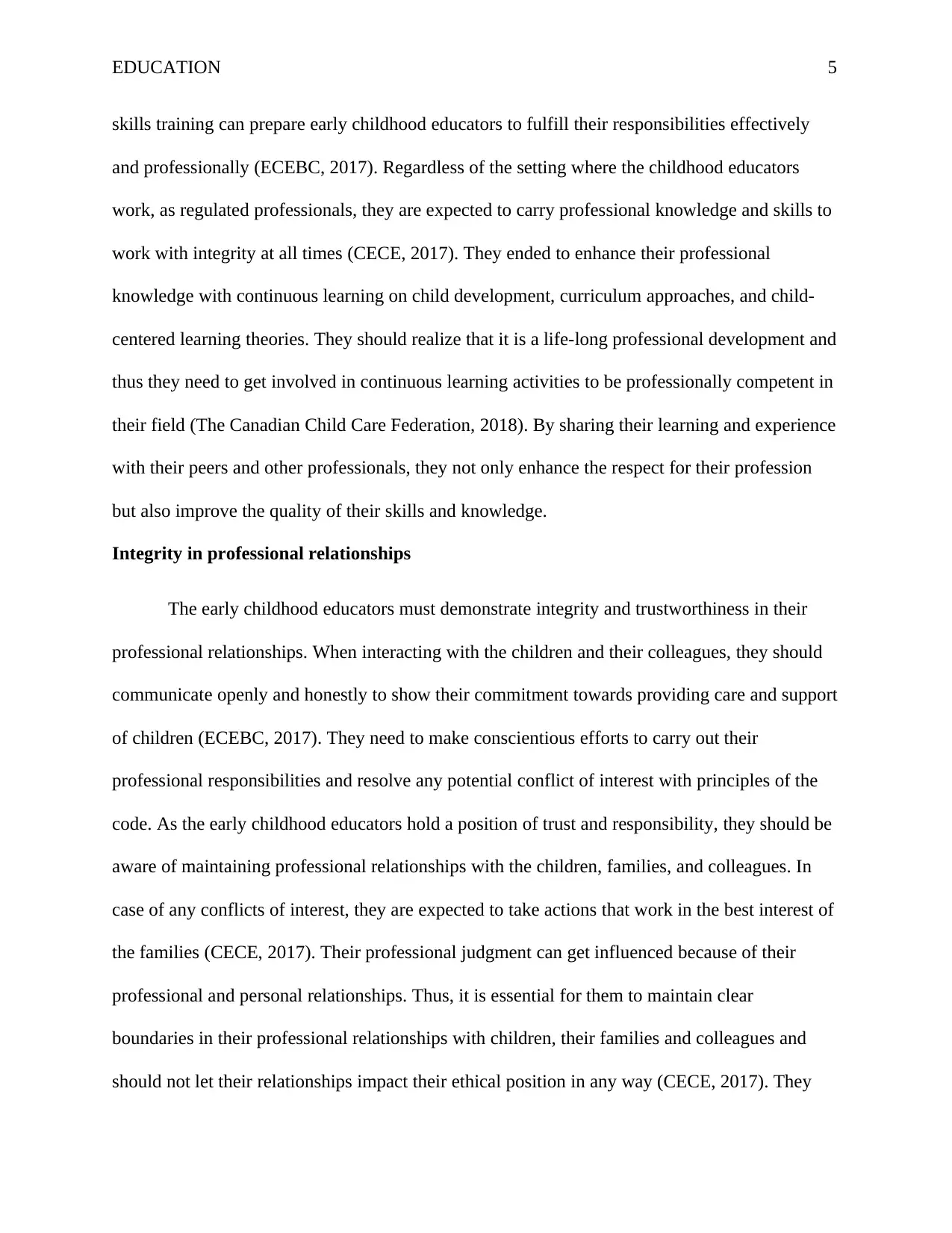
EDUCATION 5
skills training can prepare early childhood educators to fulfill their responsibilities effectively
and professionally (ECEBC, 2017). Regardless of the setting where the childhood educators
work, as regulated professionals, they are expected to carry professional knowledge and skills to
work with integrity at all times (CECE, 2017). They ended to enhance their professional
knowledge with continuous learning on child development, curriculum approaches, and child-
centered learning theories. They should realize that it is a life-long professional development and
thus they need to get involved in continuous learning activities to be professionally competent in
their field (The Canadian Child Care Federation, 2018). By sharing their learning and experience
with their peers and other professionals, they not only enhance the respect for their profession
but also improve the quality of their skills and knowledge.
Integrity in professional relationships
The early childhood educators must demonstrate integrity and trustworthiness in their
professional relationships. When interacting with the children and their colleagues, they should
communicate openly and honestly to show their commitment towards providing care and support
of children (ECEBC, 2017). They need to make conscientious efforts to carry out their
professional responsibilities and resolve any potential conflict of interest with principles of the
code. As the early childhood educators hold a position of trust and responsibility, they should be
aware of maintaining professional relationships with the children, families, and colleagues. In
case of any conflicts of interest, they are expected to take actions that work in the best interest of
the families (CECE, 2017). Their professional judgment can get influenced because of their
professional and personal relationships. Thus, it is essential for them to maintain clear
boundaries in their professional relationships with children, their families and colleagues and
should not let their relationships impact their ethical position in any way (CECE, 2017). They
skills training can prepare early childhood educators to fulfill their responsibilities effectively
and professionally (ECEBC, 2017). Regardless of the setting where the childhood educators
work, as regulated professionals, they are expected to carry professional knowledge and skills to
work with integrity at all times (CECE, 2017). They ended to enhance their professional
knowledge with continuous learning on child development, curriculum approaches, and child-
centered learning theories. They should realize that it is a life-long professional development and
thus they need to get involved in continuous learning activities to be professionally competent in
their field (The Canadian Child Care Federation, 2018). By sharing their learning and experience
with their peers and other professionals, they not only enhance the respect for their profession
but also improve the quality of their skills and knowledge.
Integrity in professional relationships
The early childhood educators must demonstrate integrity and trustworthiness in their
professional relationships. When interacting with the children and their colleagues, they should
communicate openly and honestly to show their commitment towards providing care and support
of children (ECEBC, 2017). They need to make conscientious efforts to carry out their
professional responsibilities and resolve any potential conflict of interest with principles of the
code. As the early childhood educators hold a position of trust and responsibility, they should be
aware of maintaining professional relationships with the children, families, and colleagues. In
case of any conflicts of interest, they are expected to take actions that work in the best interest of
the families (CECE, 2017). Their professional judgment can get influenced because of their
professional and personal relationships. Thus, it is essential for them to maintain clear
boundaries in their professional relationships with children, their families and colleagues and
should not let their relationships impact their ethical position in any way (CECE, 2017). They
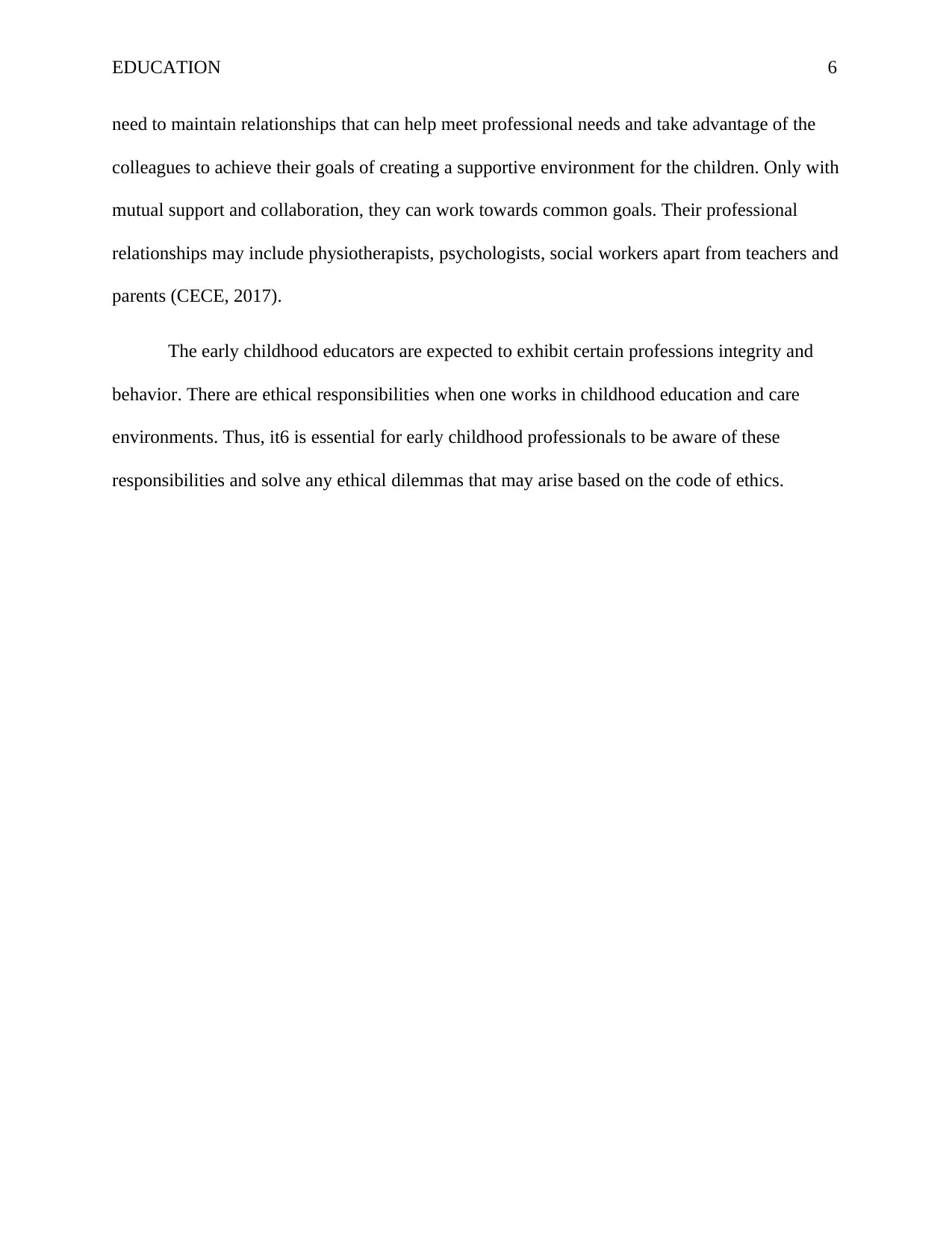
EDUCATION 6
need to maintain relationships that can help meet professional needs and take advantage of the
colleagues to achieve their goals of creating a supportive environment for the children. Only with
mutual support and collaboration, they can work towards common goals. Their professional
relationships may include physiotherapists, psychologists, social workers apart from teachers and
parents (CECE, 2017).
The early childhood educators are expected to exhibit certain professions integrity and
behavior. There are ethical responsibilities when one works in childhood education and care
environments. Thus, it6 is essential for early childhood professionals to be aware of these
responsibilities and solve any ethical dilemmas that may arise based on the code of ethics.
need to maintain relationships that can help meet professional needs and take advantage of the
colleagues to achieve their goals of creating a supportive environment for the children. Only with
mutual support and collaboration, they can work towards common goals. Their professional
relationships may include physiotherapists, psychologists, social workers apart from teachers and
parents (CECE, 2017).
The early childhood educators are expected to exhibit certain professions integrity and
behavior. There are ethical responsibilities when one works in childhood education and care
environments. Thus, it6 is essential for early childhood professionals to be aware of these
responsibilities and solve any ethical dilemmas that may arise based on the code of ethics.
⊘ This is a preview!⊘
Do you want full access?
Subscribe today to unlock all pages.

Trusted by 1+ million students worldwide
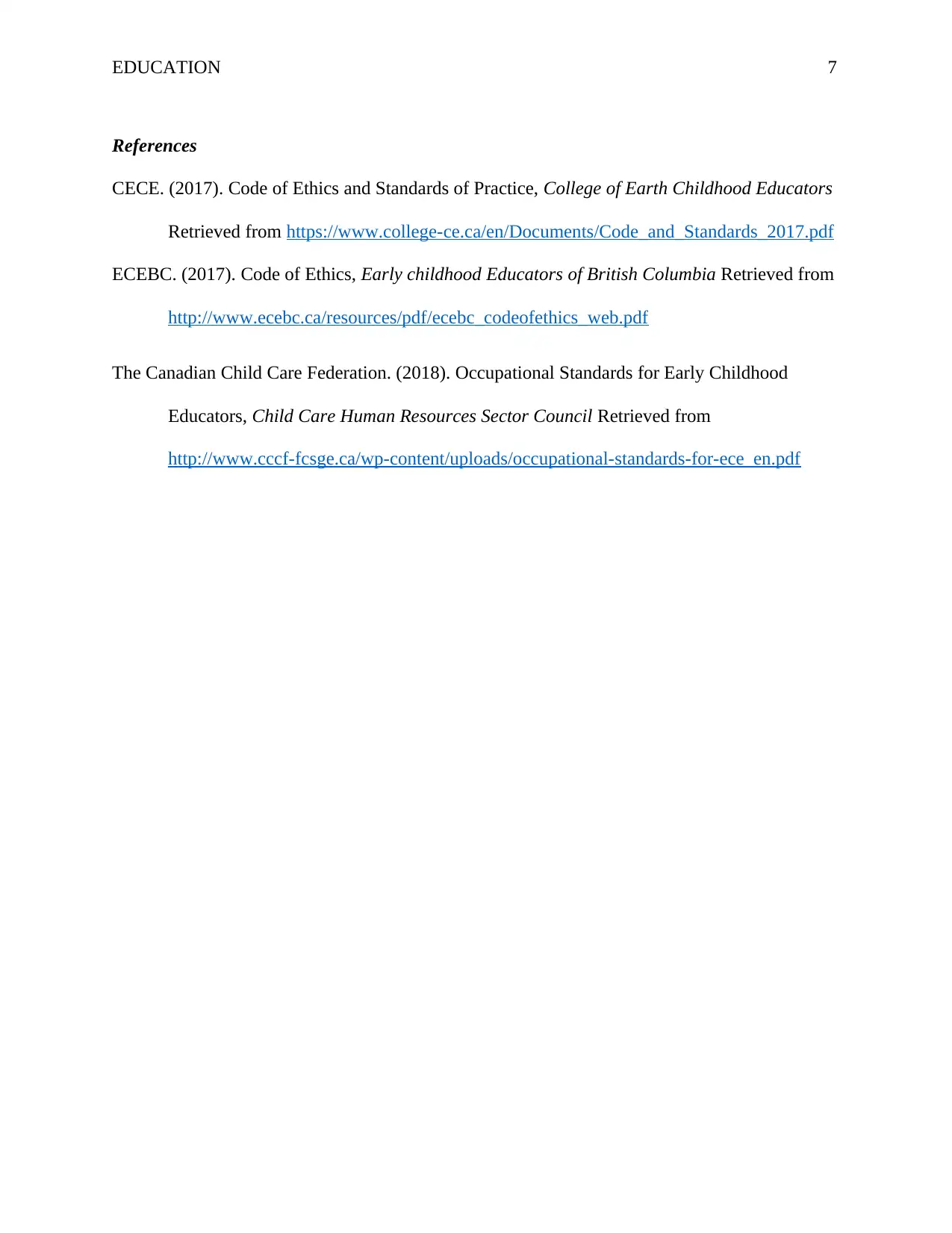
EDUCATION 7
References
CECE. (2017). Code of Ethics and Standards of Practice, College of Earth Childhood Educators
Retrieved from https://www.college-ce.ca/en/Documents/Code_and_Standards_2017.pdf
ECEBC. (2017). Code of Ethics, Early childhood Educators of British Columbia Retrieved from
http://www.ecebc.ca/resources/pdf/ecebc_codeofethics_web.pdf
The Canadian Child Care Federation. (2018). Occupational Standards for Early Childhood
Educators, Child Care Human Resources Sector Council Retrieved from
http://www.cccf-fcsge.ca/wp-content/uploads/occupational-standards-for-ece_en.pdf
References
CECE. (2017). Code of Ethics and Standards of Practice, College of Earth Childhood Educators
Retrieved from https://www.college-ce.ca/en/Documents/Code_and_Standards_2017.pdf
ECEBC. (2017). Code of Ethics, Early childhood Educators of British Columbia Retrieved from
http://www.ecebc.ca/resources/pdf/ecebc_codeofethics_web.pdf
The Canadian Child Care Federation. (2018). Occupational Standards for Early Childhood
Educators, Child Care Human Resources Sector Council Retrieved from
http://www.cccf-fcsge.ca/wp-content/uploads/occupational-standards-for-ece_en.pdf
1 out of 7
Related Documents
Your All-in-One AI-Powered Toolkit for Academic Success.
+13062052269
info@desklib.com
Available 24*7 on WhatsApp / Email
![[object Object]](/_next/static/media/star-bottom.7253800d.svg)
Unlock your academic potential
Copyright © 2020–2026 A2Z Services. All Rights Reserved. Developed and managed by ZUCOL.





